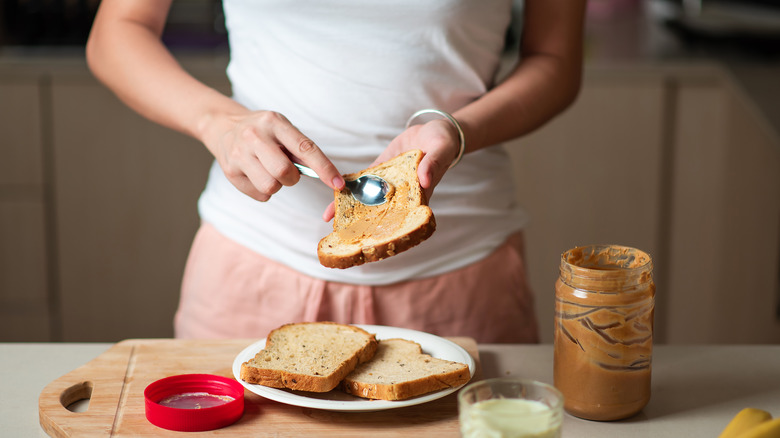
It’s rare to visit a household and not find a jar of peanut butter in the pantry. This popular, protein-rich breakfast favorite comes in various forms: crunchy, smooth, and even organic. Health professionals often recommend adding this sweet-tasting spread to your diet due to its health benefits, such as healthy fats and fiber that promote heart health and lower the risk of diabetes, as well as antioxidants and vitamins that help prevent chronic diseases like cancer. Consuming peanut butter daily also provides your body with a good amount of protein for muscle health, zinc for a strong immune system, and phosphorus for healthy bones and cells, according to Medical News Today.
Although peanut butter is generally safe for those with acid reflux or gastroesophageal reflux disease (GERD), there may be instances when consuming it causes a sensation of stomach acid moving backward into your esophagus. This could be due to the fat content in the nut butter, as per Medical News Today. In two tablespoons of peanut butter, you’ll find about 3.3 grams of saturated fat, 8.29 grams of monounsaturated fat, and 4 grams of polyunsaturated fat. High-fat foods, especially those rich in saturated fats, can exacerbate acid reflux, particularly if consumed in large portions.
You could also be reacting to the additives in peanut butter

Even though the label may say “peanut butter,” other ingredients are often included in this delicious breakfast spread. Sometimes, the cause of your acid reflux might be the additives and preservatives in it, according to Tastylicious. The added salt, sugar, and oils (especially palm or coconut oil) in peanut butter can provoke acid reflux, as noted by Medical News Today.
Furthermore, while peanut butter is not typically harmful for those with acid reflux, it is still considered an acidic, non-alkaline food. It has a slightly acidic pH level of 6.3. For those with conditions like acid reflux, it is recommended to consume more alkaline foods, such as bananas, melons, cauliflowers, and nuts like almonds and chestnuts (as peanuts and walnuts are more acidic than other nuts).
So, what implications does this have for individuals experiencing acid reflux or GERD symptoms?
How to eat peanut butter if you have acid reflux

When shopping for peanut butter, consider opting for the organic variety. Carefully read the labels and choose ones that are free from additives such as sodium, sugar, and oils.
Experts suggest choosing creamy or smooth peanut butter, as the chunky variety might cause gastrointestinal discomfort. You can also try pairing peanut butter with alkaline foods like bananas, vegetables, or regular whole grain bread to see if this helps (via Medical News Today).
One of the most crucial tips for those concerned about acid reflux is to avoid consuming excessive amounts of peanut butter. The recommended daily intake is one or two tablespoons, but you can adjust this based on how your body reacts. Additionally, monitor what else you’re eating during the meal or throughout the day to identify other possible acid reflux triggers. If you suspect the peanut butter is the culprit, consult with your healthcare provider. It may be necessary to limit or completely avoid peanut butter consumption.




